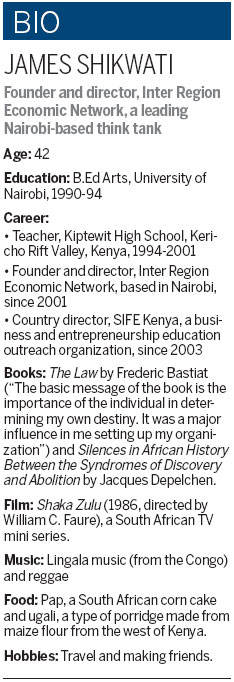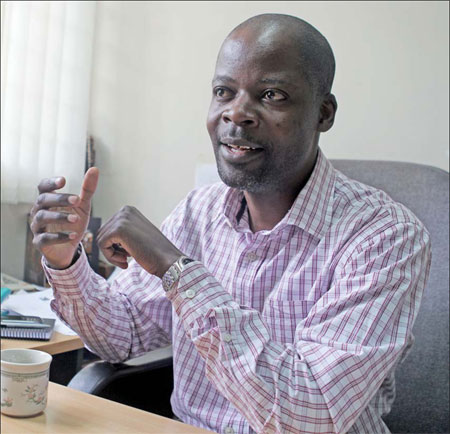China helping African consolidation
Updated: 2012-09-07 10:31
By Andrew Moody and Zhong Nan (China Daily)
|
|||||||||||
|
James Shikwati believes China is helping realize Africa's founding fathers' vision of the continent. Feng Yongbin / China Daily |

Think tank chief says chinese economy is making African leaders think in a more integrated way
James Shikwati believes China is now helping realize Africa's founding fathers' vision of the continent after independence.
The 42-year-old director of the Nairobi-based think tank Inter Region Economic Network says China's involvement in Africa is leading to the sort of unification of the whole continent that was the aim of the post-colonial leaders of the 1950s and 1960s.
"I see the Chinese coming as a godsend opportunity to now consolidate one continent as one country. It goes back to the vision of the founding fathers of Africa at the time of independence," he says.
"We have the opportunity to create from Cairo to Cape Town a free trade area worth $1 trillion."
Shikwati was speaking in his somewhat cramped offices piled full of books and documents at Nyaku House in the Hurlingham area of Nairobi over the noise of a tropical storm outside.
A long-standing critic of Western aid in Africa, the self-taught economist was voted by the World Economic Forum in 2008 as one of 250 Young Global Leaders. A year earlier, he was ranked by one of Kenya's leading media groups as one of the top 100 most influential Kenyans.
He dismisses critics of China's role in Africa and says the world's second-largest economy is making African leaders think in a more integrated way.
He cites the setting up of the Forum on China-Africa Cooperation (FOCAC) under whose banner Chinese leaders meet with leaders of African states - the fifth ministerial meeting was held in Beijing in July.
He also stresses the importance of China's investment in Africa and the building of infrastructure in helping create a more cohesive African whole.
"The Chinese have come. They have built African Union headquarters in Addis Ababa, they have built infrastructure that is now cutting across African countries and they are already steering a momentum for a possible one African state," he says.
Shikwati believes Africa's economic problems stem from the Berlin Conference of 1885 when the major European powers divided up the continent between themselves.
They created numerous artificial states that paid no regard to racial or tribal sensitivities, he insists.
"It was a question of 'I am going to take this. You can have that'. We used to have 100,000 tribes or kingdoms in Africa before the Westerners came. Then the British and the French moved in and tried to consolidate all these tribes into 54 nations," he says.
He insists those who accuse China of pursuing a new type of colonialism in Africa completely miss the point.
"The Forum on China-Africa Cooperation has a three-year strategic plan. It is about bringing all these heads of state around the table to work together. Everything is discussed and written down clearly. We say, 'Okay, we would like to have 10,000 kilometers of highway, 5,000 hospitals'. It is a discussed thing," he says.
"You can't be said to be a colonialist if you are going to be negotiating with the guy you want to colonize. That is the difference. The West took it upon itself in Berlin to decide what to do in Africa. They didn't ask us."
Shikwati says the only significant downside of the Chinese negotiating with African leaders is that the African leaders of today are not authentically African and are themselves a product of the West, since many of them are educated abroad and steeped in the culture of their former colonial powers.
"They (the Chinese) are meeting Africans who are mirror images of the West. Okay, they are sitting around the table but are they Africans in a real sense?" he says.
Shikwati, who has written for the Wall Street Journal, The Washington Post and The Guardian as well as numerous African publications, was brought up in Kakamega, a village in the west part of Kenya.
He was born in the middle of a banana plantation, where his mother happened to be at the time.
"She was probably sat reading a book," he jokes. "It was not an accident. There were no designated places to give birth. Whenever labor pains came, the word was sent round and the midwives would be sent to wherever you happened to be. There is a tradition of naming people in Kenya where they were born," he says.
A bright pupil, he attended the local Musingu High School, eventually going on to the University of Nairobi, where he studied for a Bachelor of Education degree.
After a spell teaching, he founded Inter Region Economic Network in 2001, which has since become a prominent African think tank.
"A lot of our revenues are generated from consultancy. The think tank is a vehicle that reflects my personal vision of trying to position Africa on global matters," he says.
A recent paper of his, The Optimization Trap: Why Africa must extricate itself from Western and Asian Development Strategies, published in June, argued Africans were suffering from a "corrupted mindset" but that the West and Asia's "competitive quest" to access Africa's natural resources gave Africans an opportunity to remold themselves and take charge of their destiny.
He believes the West through the international aid agencies, which he describes as huge bureaucracies, have taught Africans to be "beggars", and also that Western government intervention has always taken a hectoring attitude to the continent.
"Whatever kind of engagement they have, they want the Africans to obey, whether it is about politics, culture or economic models. They want us to have American democracy or European democracy. They want to create a mirror image of themselves in Africa."
Shikwati says the Chinese approach is different, adhering to the Five Principles of Peaceful Coexistence first outlined by then Chinese premier Zhou Enlai in the 1950s by not interfering in the internal affairs of sovereign states.
"This is a very different form of engagement and is underpinned by the setting up of FOCAC," he says.
The think tank director, who had made numerous visits to China, including a recent one to some of the country's more rural areas, also believes that unlike Britain, France and Portugal, the Chinese don't see Africa as segmented into Anglophone, Francophone and Lusophone areas.
"The British are heavily represented, for example, in areas where they were the former colonial master such as in Kenya, Tanzania and Uganda. You won't get them into Ethiopia. The Chinese will send a Chinese who speaks English to an Anglophone area and one who speaks French to a Francophone area. They just treat Africa as one," he says.
With some countries in Africa experiencing more than 20 percent growth in the first five years, some have predicted the continent will be the next Asia and will become increasingly economically important in the 21st century.
"I think there are two scenarios. The first is that 50 years from now, we are going to see a well-developed African continent, that is able to manage its resources and become more integrated. The other is that it fails to achieve this," he says.
"I think it is purely a matter of how Africa manages to navigate its relationship with China and the West. We are in a unique position to gain from both sides. We don't need to kick anybody out."
(China Daily 09/07/2012 page32)
Today's Top News
Rescuers race against time for quake victims
Telecom workers restore links
Coal mine blast kills 18 in Jilin
Intl scholarship puts China on the map
More bird flu patients discharged
Gold loses sheen, but still a safe bet
US 'turns blind eye to human rights'
Telecom workers restore links
Hot Topics
Lunar probe , China growth forecasts, Emission rules get tougher, China seen through 'colored lens', International board,
Editor's Picks

|

|

|

|

|

|






